NWO Veni grants for economic historian Selin Dilli, literary scholars Leila Essa and Mia You, and Islamic studies scholar Mehrdad Alipour
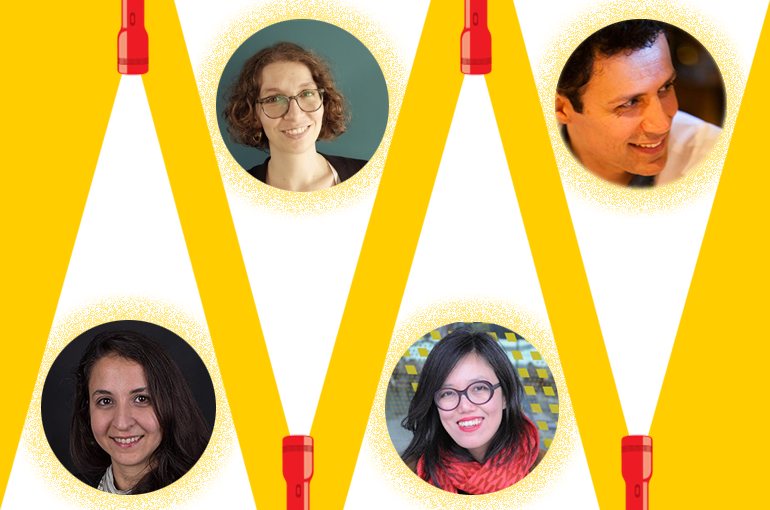
Selin Dilli (Economic and Social History), Leila Essa (Comparative Literature), Mia You (English Language and Culture), and Mehrdad Alipour (Islamic Studies) have been awarded Veni grants from the Dutch Research Council NWO, which will enable them to further develop their research ideas over the next three years. Dilli will research female entrepreneurs from 1900 onwards, Essa will study activism among writers from marginalized communities, You will study English-language poetry in a global context, and Alipour will research intersex in islamic legal tradition.
A total of 60 young researchers from the Social Sciences and Humanities (SSH) domain will receive funding of up to 280,000 euros in this postponed Veni round of 2021. Together with Vidi and Vici, Veni is part of the NWO Talent Programme. Veni is aimed at researchers who have recently obtained their doctorates. Within the Talent Programme, researchers are free to submit their own subject for funding. In this way NWO encourages curiosity-driven and innovative research. NWO selects researchers on the basis of the quality of the researcher, the innovative character of the research, the expected scientific impact of the research proposal, and possibilities for knowledge utilisation.
The Missing Entrepreneurs? The Diversity of Female Entrepreneurship in Europe, 1900-2020
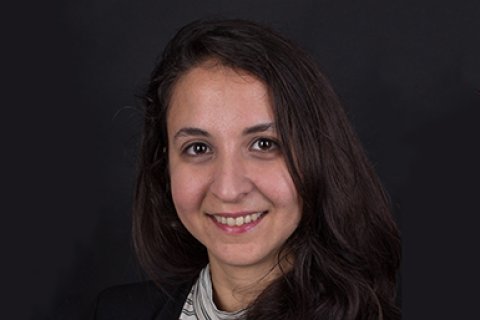
Selin Dilli
Female entrepreneurship is not a recent phenomenon. Nevertheless, we still know little about its historical development, let alone about the validity of contemporary theories to explain changes over time and between regions. Dilli’s project will change this by combining the social sciences and history disciplines to explain the change in different forms of female entrepreneurship in Europe since 1900. Her project will answer three key questions: 1) What barriers women face(d) when they start and run a business; 2) If and how these barriers change over time, and 3) How women’s solutions to these constraints change. To answer these questions, Dilli will look at the interaction between the historical structural and institutional factors and informal local solutions such as family firms. To test these explanations, she will gather new historical evidence on female business-owners and innovators for a comparative analysis of 28 European countries since 1980, and archival sources for an in-depth case-study of the Netherlands, the UK, and France since 1900. Dilli: “An exciting element of this project is that its interdisciplinary approach will lay the foundation for new intervention tools to stimulate female entrepreneurship today.”
Dr. Selin Dilli is Assistant Professor of Economic History and a board member of the interdisciplinary Philosophy, Politics and Economics (PPE) bachelor. Her research focuses on the global economic history of institutions and their consequences for gender (in)equality, (female) entrepreneurship and long-term development since 1900 to today. Being trained as a sociologist and economic historian, she uses mixed methods to analyze large historical datasets and archival material and apply theories from sociology, economics and political science disciplines. Her PhD research gathered new data to explain the (non-linear) changes towards gender equality in health, politics, economics, and households globally since 1900. Her postdoctoral research in the Horizon 2020 project ‘Financial and Institutional Reforms for an Entrepreneurial Society in Europe’ (FIRES) offered a distinct approach by demonstrating how the complementarity of institutions, instead of single ones, explains the diversity in (female) entrepreneurship today. Currently, she is a NIAS/GAK fellow to carry out a pilot research on Dutch female entrepreneurs, which provides the basis for her Veni project’s comparative case-study analysis.
An exciting element of my project is that its interdisciplinary approach will lay the foundation for new intervention tools to stimulate female entrepreneurship today.
Didactic Intention and Cultural Intervention: Contemporary Activist Authorship in Germany and Britain
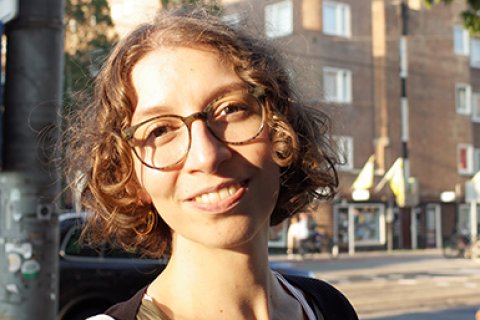
Leila Essa
This project probes how we must redefine ‘didactic art’ in the face of intentional strategies for discursive interventions developed by authors from marginalised communities. It centres writers who explicitly and often collaboratively fuse their social justice activism and their artistic work, specifically examining networks that connect writers of colour and Black, (post)migrant and Jewish writers in and across Germany and Britain. Through this explicit focus on authors whose position in their cultural scenes and societies is always already politicised, the project shifts away from supposedly ‘universal’ critical approaches to authorial intention. Instead, it accounts for the discriminatory structures marginalised authors encounter in the cultural industries and for their existential stakes in strategically designing their works to reach – and teach – wide audiences. Comparative, cross-media case studies investigate how such strategies aesthetically manifest in their works of literature, theatre, and film. These studies combine close readings and analyses of production processes with interviews and workshops with the corpus’ creators themselves. For rather than merely attributing intentionality, this project positions authors as active research participants in exploring contemporary didactic strategies – and their translatability across cultural contexts.
Dr. Leila Essa is a Lecturer in Comparative Literature. Before joining Utrecht University in 2021, she was a Teaching Fellow in the Department of Germanic Studies at Trinity College Dublin and obtained her PhD in German, English and Comparative Literature at King's College London. Her doctoral research project 'Partitioned Nations, Shared Narratives' explored the allegorical potential of shared spatial motifs in novels on the colonial partition context of India and the Cold-War border shifts in Germany. The resulting book project has been awarded the Women in German Studies Book Prize 2021 and her research has appeared in Comparative Literature Studies, Anglia and the edited volume Displacement and Citizenship. Beside her academic work, she writes for public-facing outlets like Zeit Online.
My project positions authors as active research participants in exploring contemporary didactic strategies – and their translatability across cultural contexts.
Poetry in the age of global English
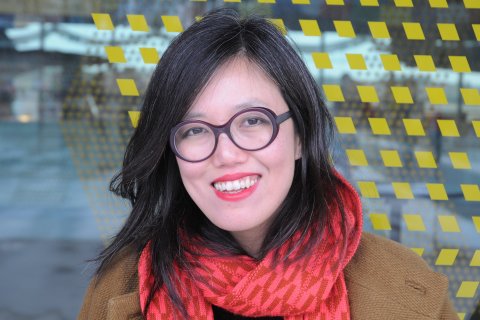
Mia You
This project examines how contemporary Anglophone poetry responds to the shifting political, economic, and aesthetic dynamics re-contextualizing and re-signifying the English language on a global scale. English is the most used language in the world, but now non-native speakers of English far outnumber native speakers, such that, as various linguists have pointed out, what has been called “Global English” should be regarded as a broadening variety of “New Englishes.” Through combining scientific and artistic research, Mia You explores how Anglophone literature can help develop strategies for intervening upon the language’s global domination, rather than simply reinforcing it.
You: “I’m interested in how we might find pathways for the English language to co-exist with and even reinforce the vitality of local cultures. For this purpose, I propose that poetry might be language’s best-equipped laboratory. Poetry’s value lies in how it dissects, defamiliarizes, and innovates standard language use, contributing to its capacity to traverse linguistic, cultural, and medium-specific borders. Poetry, as a creative form, provides a space for working through how to engage with English critically as opposed to communicatively. The way we interpret and analyze poetic language, which is inherently multilayered and sometimes ambivalent, could help us develop more general creative strategies -- not focused on poetry only -- for understanding how English language usage operates simultaneously but varyingly within global and local contexts.”
Dr. Mia You is an Assistant Professor in the English Language and Culture programme. She received her PhD in English literature at UC Berkeley. She is the author of the poetry collection I, Too, Dislike It (1913 Press, 2016), and her next collection will be published bilingually (English and Dutch) by Uitgeverij Chaos/Das Mag. In addition to contributing essays to volumes such as De Goede Immigrant (Uitgeverij Pluim, 2020) and Gertrude Stein in Europe (Bloomsbury Academic, 2015), her writing has appeared in journals and magazines such as Artforum, Boston Review, ELH, Los Angeles Review of Books, Poetry and Public Books. She is currently working on translating poetry collections by the South Korean poets Kim Haengsook and Kim Hyesoon.
I’m interested in how we might find pathways for the English language to co-exist with and even reinforce the vitality of local cultures. For this purpose, I propose that poetry might be language’s best-equipped laboratory.
Beyond Binaries: Intersex in Islamic Legal Tradition
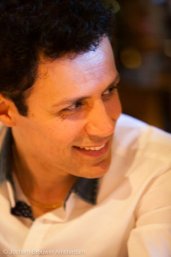
Mehrdad Alipour
The current traditional Muslim and the orientalist approaches predispose Islam to an unequivocal intolerance of trans-genderism or non-binary sex/gender divisions. By contrast, Islamic legal discourses on sex or gender are oftentimes surprisingly dynamic. Notably, since the post-classical period (the 16th c. CE), several Shiʿi jurists have categorised intersex people as a third nature (third sex and/or gender). However, the tendency of the scholars in the West to delve into classical Islamic sources has left the post-classical and modern debates on intersex virtually untouched. This neglected idea of a third nature presents a challenge to the binary conceptions of sex or gender in Islamic Studies. This project thus examines the legal assessment of intersex as a third category in Shiʿi law from the post-classical period to the early twentieth century. ‘Beyond Binaries’ is grounded in the text-based, historical, and legal-hermeneutical approaches, which make it possible to deconstruct the rigidity of the current debates on sex/gender in Islam by referring to the repertoire of Shiʿi legal sources. The study combines these approaches with a genealogical approach to sex/gender in post-classical Islamic law. Such combination enables the study to compare the modern phenomenon of intersex with premodern sex/gender categories related to intersex people in Muslim societies. By joining this line of research with the existing scholarship on Islamic law about intersex, the project aims: (1) to make a pioneering contribution to understanding the Islamic legal tradition of the post-classical period to the early twentieth century concerning intersex people; (2) to integrate the missing study of Shiʿi law on intersex identity into the broader field of Islamic legal studies, and provide a vital addition to the common Sunni-based approach to the topic; and (3) to provide a foundation for comparison between intersex identity in Shiʿi and current international laws regarding the third sex/gender category.
Dr. Mehrdad Alipour is currently a postdoctoral researcher at Goethe University of Frankfurt, participating in the two-year project Wege zu einer Ethik which examines classical Islamic thoughts and how they might be employed to tackle modern issues concerning gender and sexuality in Muslim communities. Having graduated from the Seminary of Qum (Iran) and received his first PhD in Comparative Philosophy (Centre of Tarbiyat Modarres University of Qum, Iran), in 2014 Dr. Alipour reoriented his academic approach and started to research and publish on Islamic law and ethics regarding gender and sexuality. In 2017-2020, he pursued second doctoral research in Arab and Islamic Studies at the University of Exeter (U.K.). His PhD dissertation titled Negotiating Homosexuality in Contemporary Shiʿi Islam is the first academic exploration of discursive space(s) for debating homosexuality in modern Shiʿi Islam, based on a legal-hermeneutical analysis of Islamic law. His monograph Ḥikmat-i Ishrāq-i Suhrawardī (The Philosophy of Illumination of Suhrawardī) was awarded the prestigious Fārābī International Award in Iran in 2013.
This project compares the modern phenomenon of intersex with premodern sex/gender categories related to intersex people in Muslim societies.

